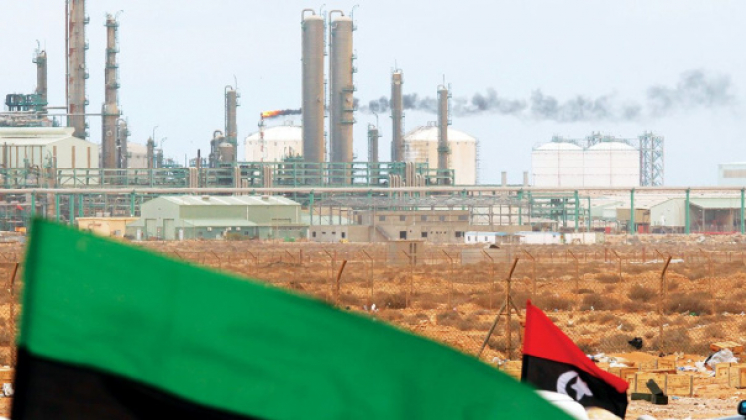
Since the overthrow of the government in 2011, Libya has been divided. Tripoli and the West sought to control the eastern part of the country, a fiefdom of the “Libyan National Army” (LNA) led by Field Marshal Khalifa Haftar. Subsequently, dual power prevailed and the country ceased to function as a single State.
The people and parliament in the east opted for cooperation with the “Libyan National Army” led by Marshal Haftar. In the west, in the capital Tripoli, the UN- and EU-backed Government of National Accord (NAC) led by Fayiz Saradj ruled. His term has already expired.
Other countries have reacted differently to events in Libya. In 2011, Greece supported NATO’s military operation against Muammar Gaddafi by providing its members with military airfields and a naval base. However, the Greek military was not directly involved in the operation. In 2020, Turkey deployed its troops and loyal Syrian mercenaries to Libya, who first stopped the offensive of Khalifa Haftar’s “Libyan National Army” and then pushed it back from Tripoli to Sirte. Haftar could only be saved by Cairo, which threatened Ankara with introducing its troops into Libya.
Diplomatic relations between Cairo and Ankara were severed in 2013 after then-Egyptian army chief As-Sisi led a military coup against Egyptian President Mohamed Morsi, backed by Erdogan (and the Muslim Brotherhood, a banned group in Russia).
Turkey, during the visit of a high-level Turkish delegation to Cairo in 2021, found itself at a disadvantage: first, because of the Qatari blockade, and second, because Ankara was not accepted into the gas forum, which brought together almost all the Eastern Mediterranean countries, including Italy, Egypt, Greece, Israel, Greek Cyprus, Jordan, and Palestine. What Ankara did not like was the strengthening of friendship between Greeks and Egyptians.
The Turks then suggested that the Egyptians forget all old grudges and reconcile. Cairo was rather wary of the suggestion. The Egyptians responded by suggesting that the countries should first overcome their accumulated differences. The issue at hand is the criticism of the Egyptian leadership by the Turkish media. Cairo is also dissatisfied with the 2019 military cooperation agreement signed with Faiz Saraj’s former “government of national accord,” which entitles Turkish military forces to be on Libyan territory, and with the document on the demarcation of maritime borders with Libya. Cairo also asked Ankara to stop interfering in the internal affairs of Arab countries and not to grant Turkish citizenship to Egyptians living in Turkey.
The Turks have since met some of the demands, such as moderating criticism of Egypt on their television channels. Nevertheless, Turkey continues to push the Blue Homeland concept of expanding its water holdings in the Aegean Sea, Mediterranean Sea and Black Sea. To this end, Ankara intends to conclude a similar agreement to demarcate its maritime borders with Egypt, which could turn the Mediterranean into a “Turkish lake” in the future, at Cairo’s expense. It is no coincidence that many experts believe that it is precisely on the Libyan track that Cairo and Ankara will find it most difficult to negotiate mutual concessions. The Turks and Egyptians are unlikely to agree to cede important positions in Libya, which are of strategic importance to both countries, to each other.
It is possible that a delegation of Libyan officials, led by parliament speaker Aguila Saleh, traveled to Cairo in mid-December to reconcile the positions of Egypt and its Libyan allies. The visit’s agenda included meetings with Egyptian Foreign Minister Sameh Shoukry, UN Special Envoy to Libya Abdoulaye Bathily and Arab League Secretary-General Ahmed Abu al-Ghaith. During the meetings, Sameh said that the current Libyan prime minister, Abdul Hamid Dbeiba, will have to carry out a number of tasks in preparation for the upcoming Libyan elections, the date of which has not yet been set.
However, these tasks have not yet been completed, the prime minister has effectively derailed them, jeopardizing the finalization of the so-called constitutional framework, that is, the drafting of the constitutional provisions that determine the modalities and rules of participation in the elections. At one time, this was the reason why the parliamentary and presidential elections scheduled for December 2021 never took place.
In early December last year, Libya’s National Oil Corporation (NOC) also called on international companies with which it had previously signed oil and gas exploration and production agreements to resume operations in the country. The organization said in a statement posted on its official website. The NOC justified the call with the gradual improvement of the security situation. For its part, the defunct “Government of National Accord” led by Abdel Hamid Dbeiba also called on foreign investors to return and resume operations in the fields. Western companies have begun negotiating working conditions, but so far little progress has been seen. Overall production and shipping figures were generally good last year, with total revenues of $22 billion. But because of political instability, disruptions could continue as early as 2023.
